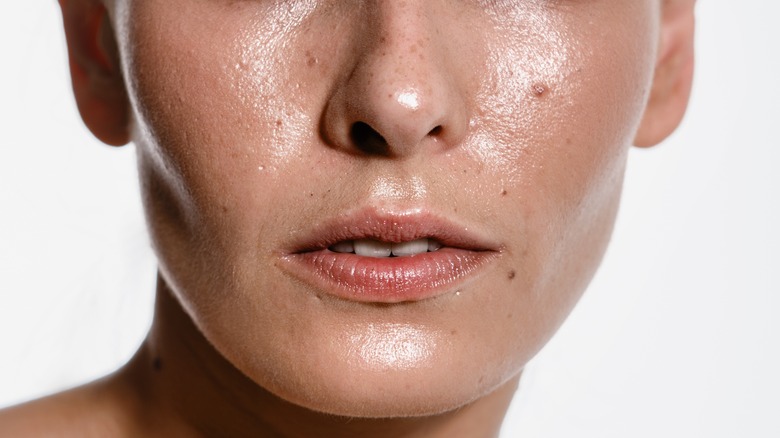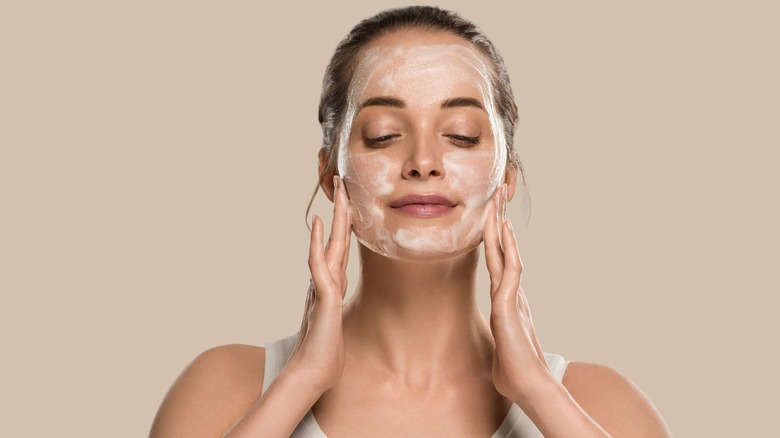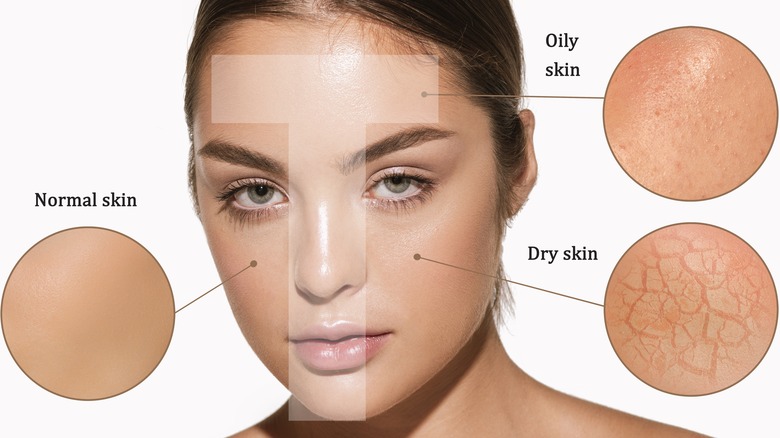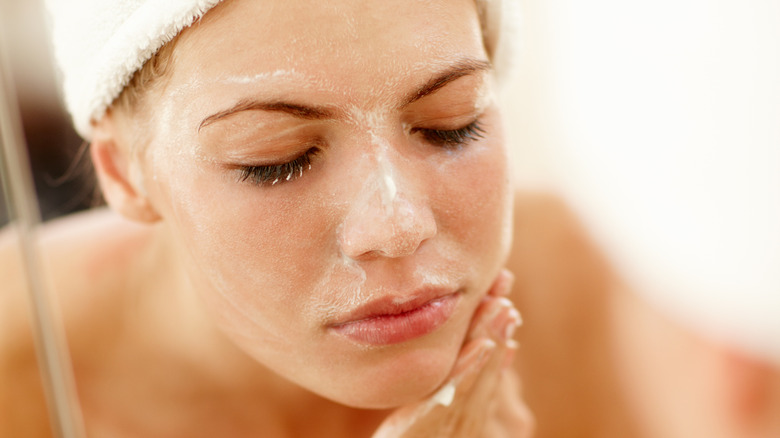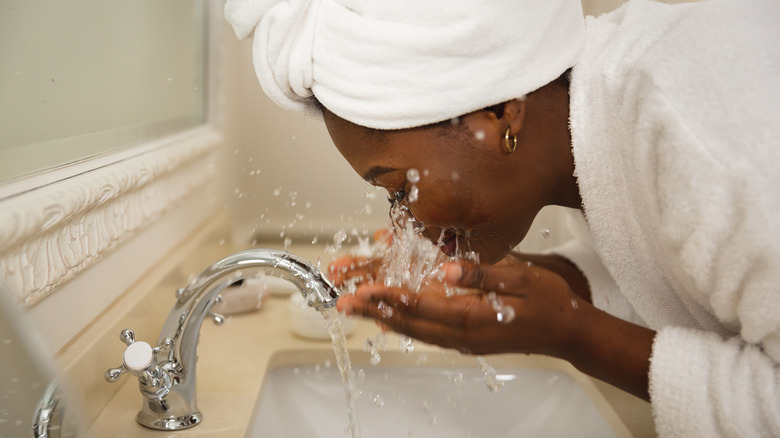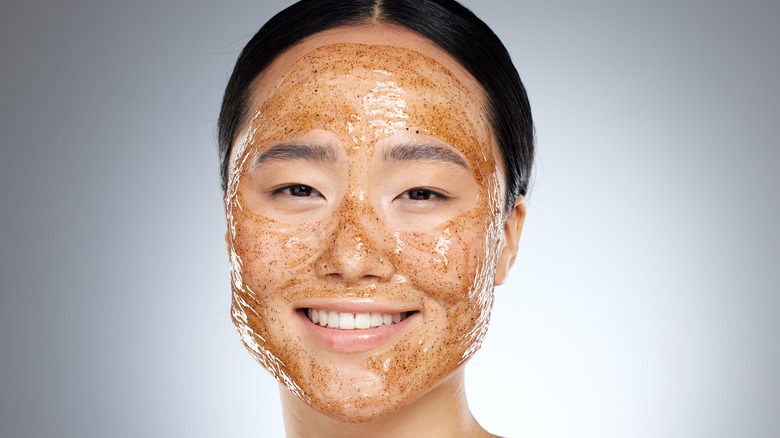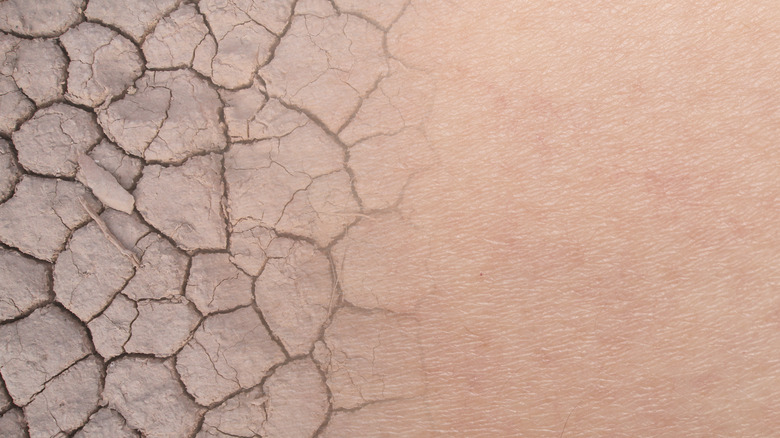11 Skin Care Mistakes That Are Causing Your Oily Skin
Finding the best skin care routine for oily skin isn't necessarily easy. Everywhere you look, you see the same message — beauty comes from the perfect glow. But when you produce too much oil, your natural shine becomes your battle. And this isn't just something that happens to teenagers. Ines Mordente, a dermatological surgeon and specialist in Italy, says it's "a common mistake ... to associate oily and seborrheic skin only with adolescence and that's not the case." She continued, telling The Italian Rêve, "Even in adulthood you may suffer from oily skin."
To address your oily skin, you first need to understand the cause of its disharmony. Every skin type can find the right balance for a flawless complexion, but not if they're managing their skin incorrectly. Of course, we're all guilty of making skin care mistakes at times — it's just a part of the process — but by understanding where you're going wrong, you can fix the problem and effectively manage your oily skin.
Washing your face in the morning and at night
Washing your face every morning and night seems practical — you brush your teeth before bed and again after you wake up, after all. But faces don't grow bacteria at night at the same rate as mouths; faces stay pretty clean during sleep, so there's typically not much to wash off in the morning, board-certified dermatologist Orit Markowitz told Byrdie. By rewashing your face in the morning, you're often stripping it of oils your skin needs to stay moisturized. And without that necessary moisture, your skin will actually produce more oil as a way to compensate. Instead, Dr. Markowitz recommends simply rinsing your face with water in the morning.
As with most rules, though, there are some exceptions. If you don't go directly to bed after washing your face, you may need to cleanse in the a.m. Those with extremely oily skin types may also wake up with excess facial oil. According to Dr. Markowitz, though, you still shouldn't need to cleanse your face as you do before bed. Instead, try a cross between water and cleanser, like micellar water. The gentler solution removes the excess oil without drying out the skin.
Assuming your skin type
One of the biggest skin care mistakes you can make is assuming you have a particular skin type instead of discovering your real skin type. If you think you have oily skin when it's actually normal or dry, you may be antagonizing the problem. Your type of skin determines every aspect of your skin care regimen — it defines which products will work, the ingredients you should use and avoid, and the regularity with which you'll need to use them.
Drying out already naturally dry skin will sned a signal to amp up sebum production. While some sebum is necessary, too much of it will create a greasy sheen. Understanding your skin's natural state lets you know what your skin needs and how to manage it.
Fortunately, you can conduct an easy test at home to discover your skin type. It's as simple as washing your face with a gentle cleanser and doing nothing to it for a half-hour. After the timer is up, check your skin. If you notice a sheen of oil over your face, chances are you have oily skin. If your face feels tight, you likely have dry skin. If your skin is neither shiny nor tight, you're probably in the normal skin category. And if your skin is shiny in some areas and tight in others, you have combination skin. It's a good idea to repeat this test every so often, as skin types are not static — they can, and do, change over time.
Using the wrong products
Obtaining the perfect balance of dewy but not too oily skin can feel like an impossible battle. You prepare for combat with an arsenal of products to fight this or stop that, but what if the products are the problem? Following the wrong skin care routine can exasperate oil production.
Certain skin types may need to change their regime depending on the season and where they live. If you have combination skin and live somewhere with all four seasons, you'll likely need to switch up your products between summer and winter. This is especially true if you live somewhere with a climate that ranges from wet and humid to dry and arid. The environment plays a significant role in all skin types' balance, but especially for those with combination skin.
Perfecting your routine is an exploration into chemistry, but it doesn't need to be complicated. All you need to learn are the ingredients for your particular skin type. For instance, the American Academy of Dermatology Association recommends oily skin types use gentle oil-free foaming cleansers over oil- or alcohol-based face washes. The oil can leave a residue on your face, making it greasy, while alcohol-based washes may dry out your skin, increasing sebum levels. Similarly, sunscreen is crucial for everyone, but oily skin types need an oil- and fragrance-free formula to avoid exasperating oil production.
Washing your face once at night
Washing your face every night is one of the more basic skin care concepts. But for people with oily skin, washing your face twice before bed may be more beneficial, dermatologist Jane Wu told the Cleveland Clinic.
The process involves two different types of cleansers and, believe it or not, begins with an oil-based cleanser. If your hair prickles at the sound of an oil face wash, still consider giving this system a chance. The oil-based cleanser effectively removes sebum from your skin. While these face washes typically leave behind too much oil for oily skin types, the second wash eliminates that problem. After using your hands to work in the oil-based cleanser, rinse with lukewarm water. Avoid drying your skin with a towel after this step and instead move on to washing your face with a water-based cleanser, which will remove any leftover residue from the first wash. So, why even bother with the first wash? Combining both steps provides a gentle method for a deep cleanse and avoids stripping your face of hydration and protective barriers.
If you don't plan to follow the two-wash method, though, make sure to only use a water-based cleanser.
Washing your face with water that is too cold or too hot
Hot water is often associated with getting things clean — from your hands to your clothes. So wouldn't it make sense to use hot water to wash your face?
Hot water can help break down oil and bacteria and leave the skin squeaky clean. But skin isn't meant to squeak — it needs moisture and operates best when it's soft and silky. Scalding hot water breaks down proteins, weakening the skin's defenses to everything from bacteria to wrinkles. It dries out the surface and sends that dreaded signal to the sebaceous glands to produce more oil.
This doesn't mean you need to use ice-cold water, though. A little heat can help break down oil and dirt, making lukewarm water the optimal temperature. "Warm water is always best as hot can strip the skin of its natural oils and cold does not allow the pores to open to remove dirt," dermatologist Roberta Del Campo told NBC News. Lukewarm is, in fact, what the American Academy of Dermatology recommends.
Exfoliating too often or not often enough
Exfoliating is a crucial step in everyone's skin regimen, regardless of skin type. As far as skin care mistakes go, this one is far too common and goes to both extremes. For some, exfoliating seems unnecessary, possibly due to sensitive skin or a lack of awareness of the benefits. On the other side of the spectrum are those who over-exfoliate their skin to the point of stripping their faces.
Some form of skin scrubbing or resurfacing is crucial to breaking down oils and leaving the skin clean. It wipes away dead skin cells that block moisture, clog pores, and leave your face dull, uneven, and looking tired. To achieve smooth, glowing skin, you'll need to strike a balance in your exfoliating routine. Remember, your skin is a delicate organ, not your bathroom sink. "[Over-exfoliating creates] tiny cracks in the skin barrier that lead to more loss of hydration and inflammation," board-certified dermatologist Joshua Zeichner told Allure.
Although people with oily skin can typically tolerate exfoliating more often than those with normal or dry skin, daily exfoliation is still not recommended. "Up to three times weekly" is a safe bet, board-certified dermatologist Shari Marchbein told the publication.
Not embracing moisturizer
You may have heard the myth that moisturizer is enemy No. 1 to people with oily skin. While it does make sense to reason that if your skin's producing too much oil through sebum, why should you lubricate it more? However, moisture and lubrication aren't one and the same, and all skin types, even oily skin, need moisturizer. When the skin is lacking in moisture, it sends signals to the sebaceous glands to increase production. These signals result in an overgeneration of oil, leaving the skin slick and shiny.
If you've tried moisturizer in the past and felt it only made your oily skin oilier, that was likely due to using the wrong type of product. Those with oily skin need to use an oil-free moisturizer, as it lacks ingredients known for clogging pores; otherwise, sebum can get trapped. Find a lightweight moisturizer with humectants like glycerin, which reduces water loss while improving skin hydration.
Giving in to those salt cravings
When it comes to diet, there's a lot of controversy over its impact on the sebaceous glands. Some small studies indicate a connection between diet and sebum production, while others point to the opposite. One thing experts agree on is that too much salt causes dehydration. And that's a problem for oily skin.
On the surface, it may seem like drying yourself out would be the best way to manage excess oil, but hydration is necessary no matter your skin type. As highlighted, when the delicate organ becomes overly dry, it seeks to moisturize itself and produces large amounts of sebum. This sends your sebaceous glands into overdrive to make up for thirsty skin, leaving it oily and dehydrated.
For healthier skin, try limiting foods high in sodium and drinking more water. By continuing to eat a high salt diet and not managing your water absorption levels, you can create a cycle of excessive sebum production. So, if you love eating chips and other salty foods, it may be time to monitor your intake. You could discover it's the culprit to your imbalanced complexion.
Ignoring your dehydrated skin
There is a difference between dehydrated and dry skin – the former lacks hydration or water concentration, and the latter needs lubrication. It's easy to mistake one for the other because they both result in excess oil production. If your skin feels tight, itchy, and it wrinkles easily when pinched, your skin may be dehydrated. When your lips start forming lines and looking dry, it indicates you need more water. Dull skin is another symptom of poor hydration.
If you have dry skin, peeling or flaking of the epidermis can accompany the itchy feeling. If you discover your skin's dehydrated, don't let the excess oil fool you, it's time to improve water retention. Increasing your water intake is a good first step — you'll be amazed by what drinking water can do for your skin. Next, switch to products that are formulated to be hydrating. You may have gravitated away from such products, thinking they'll only make your oily skin oilier. Thankfully, that's not true — there's no good reason to deprive your skin of the moisture it needs.
To hydrate oily skin without adding any excess oil, stick with water-based products. Moisturizers that contain hyaluronic acid or glycerin are great choices, board-certified dermatologist Jenny Liu told MindBodyGreen.
Letting stress and hormones go unchecked
Hormones can, unfortunately, be the culprit of your oily skin. "The hormones that cause our glands to produce more oil are the male hormones — androgens that both males and females have," board-certified dermatologist Yoram Harth told Insider. If androgens are to blame, hormonal birth control can help. However, stress hormones can also play a role in oily skin.
When cortisol production ramps up, so too do the sebaceous glands. The more you stress, the more cortisol you generate — the more cortisol that is produced, the more sebum you make and the oilier your face becomes. Of course, stressing over stress only exacerbates the problem.
Managing stress can be difficult, but self-care can help. Breathing exercises and meditation can help increase your overall mental fortitude, improving your ability to handle life's stressors. Another way to reduce stress is by giving yourself regular breaks. By taking the time to decompress throughout the day, it's easier to avoid hitting your limit. Whether introverted or extroverted, social interaction is also crucial to managing stress.
Touching your face
Touching your face is a bit of an ingrained habit. You may not even notice yourself doing it. All sorts of things bring your hands to your face — whether it's an itch, a hair falling out of place, or the urge to rub your eyes or pick a zit. Unfortunately, the American Academy of Dermatology Association warns that when you touch your face, you submit it to all of the germs on your hands, as well as the oils and dirt on your fingers.
Whether your oily skin treatment plan is perfect or needs improvement, if you follow it up by touching your face too much, your skin will continue being oily. While it's unreasonable to never touch your face, reducing the amount you do so can reduce oil buildup over time. Also, washing your hands before you need to touch your face is a good habit to get into. Clean hands don't have oil to spread around.
